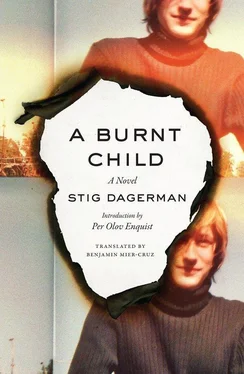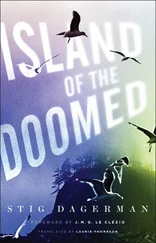The music begins. A violin and an organ, and as they play in the gallery, the son looks down at his fiancée’s hands, which are quivering rhythmically like a leaf inside her gloves. Then he looks at his father’s hands. They are resting heavily and motionless on his lap. But suddenly they pull out a watch and begin opening and closing the watchcase, over and over again until the music stops. The pretty sister is fiddling with a ring, twisting and turning it. Then she takes it off and seems lost. But the ugly sister cannot see the casket very well, so she huffs on her lenses and wipes them with a large white handkerchief. Now she can see better. And at the very front, nearest the casket, the woman holding the banner is standing stiffly, but they can tell from the fluttering of the veil that she is shaking.
The pastor begins to speak. It is a speech about a good wife to a good husband and a good mother to a good son and a good daughter. So the pastor thinks the son’s fiancée is the daughter of the deceased. This makes everyone annoyed with her, but they look in her direction anyway. She, for that matter, is biting into her glove and crying—she cries easily. The pastor talks about a strenuous life and about the great amount of patience needed to endure an illness. And all the women sob into their handkerchiefs or the sleeves of their coats, because they all have their own illnesses. Finally, the pastor speaks about the good fortune she had to die at home, surrounded by her dear loved ones. Then all the men bite their lips, either harshly or lightly, because they are all afraid of dying. But the son is fumbling after a handkerchief, which is damp and smells like perfume. Then at the graveside the sand starts to rattle and the coffin, with all its flowers, sinks down slowly like a cinema organ. They try to keep it in sight for as long as they can, like a train vanishing with a friend on board. At last, there is nothing left. Just a hole in the ground that smells like flowers and, soon, not even flowers. Now the widower is standing by the hole. He is standing nervously and a little hunched over, and they can see his watch dangling behind his unbuttoned coat. And every time he tries to speak, it swings like a pendulum behind the black coat.
My dear, he says.
But tears overcome him. Suddenly, certainty lashes him like a whip and he gives a start so violent that one of them fears he is about to fall in. But he does not fall in. He merely leans over the hole. Then he takes a step back, his expression frozen with certainty. But when he is back at his seat, the pastor lays his large hand reassuringly over the father’s until it stops trembling and becomes as still as a stone.
The son reads a poem at the graveside. It’s on a little sheet of white paper that had been in the same pocket as the wet handkerchief. Now the poem smells like perfume and the ink has smeared to the edges, but this isn’t why he is reading so poorly. It is because he is crying. He knows the poem by heart, and the last verses, once he has settled down, go very well. His voice is steady and calm now, and he sounds perhaps even a little pleased with himself.
The father is also pleased because he appreciates anything beautiful. He appreciates beautiful poems at beautiful funerals. He looks at the pastor, but the pastor is merely listening. But he is listening beautifully. After all, he’s accustomed to listening gracefully to funeral poems. It’s a long poem even though the paper is small, and once it is read, several of them shift their gaze toward the pastor to see what he thinks of their service.
But for the son the page is instantly blank. He is standing in front of the hole with a piece of paper in his hand, and his hand is trembling. He looks at the white empty space and can’t make out a thing. So he looks over the edge of the paper, and his eyes sink lower and lower. The edges of the grave are gray and smooth. The coffin’s lid is yellow and cold. The flowers gleam red.
It isn’t until then that he finally understands. And it’s difficult to understand. One step forward and he is crying. One step more and he knows this is the end. A handkerchief firmly against his eye and he senses there is no more delay. No more death announcements to compose. No invitations to write up. No poem to think about at night when he’s unable to sleep. No solace and no sanctuary, and no end and no beginning. Only a certainty, as empty as the grave, that his mother is lying down there and that she is dead, irretrievably gone. Beyond prayers and thoughts, flowers and poems, tears and words. And with a handkerchief pressed against one eye at a time, he cries with emptiness, cries and cries, because emptiness has more tears than anything else.
The pastor cautiously guides him back, a stone hand pulls him down to his seat, and then a stone arm wraps around his shoulder. Through a curtain of tears he then sees the woman with the banner go up and lower it three times into the hole, but when the banner comes up the third time, the mourning veil comes loose and floats slowly down to the ground. Then they all walk around the grave one last time. Those with bouquets let them fall. They either bang against the coffin lid or fall rustling onto a wreath. The others just look—a brief glimpse or an extended gaze—take two steps back, and shake the pastor’s hand.
But at the edge of the grave, the son frees himself from the stone arm, and with emptiness throbbing in his throat he rips his poem into tiny, tiny pieces. So small that it looks like snow dancing delicately over the coffin, covered by flowers and tears.
They drop the pastor at the snowdrift in front of the parsonage. He is in a hurry, and now no one thinks he was ever crying. It’s snowing hard, and on the way back to the city the five cars have lost each other in the snowfall. They became six and then seven in the funeral procession. A butcher’s van has joined them as well as a small truck with furniture. And when it clears up on the bridge for half a minute, they can see a cabinet with a mirror from one car and a large slaughtered animal from another. The ride back from the cemetery has been a difficult one. The whirling snow has whipped tears out of the ones who haven’t cried. But for the ones who have been crying, it has stripped them of their sorrow and provided empty teardrops instead. They invited the woman with the banner and her companion to ride in the last car, and because the flagpole is so long, they had to leave one of the windows open. Snow has therefore drifted inside, and the man who is sick has complained the whole way, talking about his illness and about how sensitive he is to the cold. But the two women from the club were talking about Alma.
Alma was a good friend, they were saying; you couldn’t find a better friend than her.
But nobody has agreed with them; they merely sat in silence without conceding. And when they stepped out at the top of Södermalm, someone hastily rolled up the window, looking forward to a warm funeral meal.
And it’s warm in the restaurant. Warm and elegant. It feels a little strange that the waiters are wearing such white jackets and that they bow so low. They probably could have had it at home—the funeral meal, that is. The sister with glasses could have made the food, and the sister without glasses could have served it, and they would have had enough space. But it’s a fine restaurant, and the private room, which the widower has rented, is a beautiful and impressive room, since the widower has a taste for anything beautiful and impressive, even if it costs him.
In this regard Alma was cheap, some of them think as they enter the private room, and had dear Knut died first the funeral meal would have certainly been at home—if there would have been any meal at all. At the very most maybe a little coffee at first, then a glass of wine and some cake afterward.
Читать дальше












